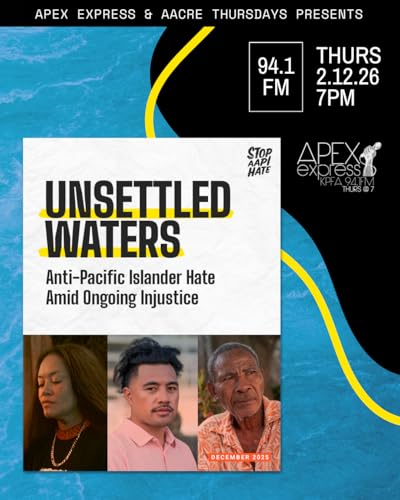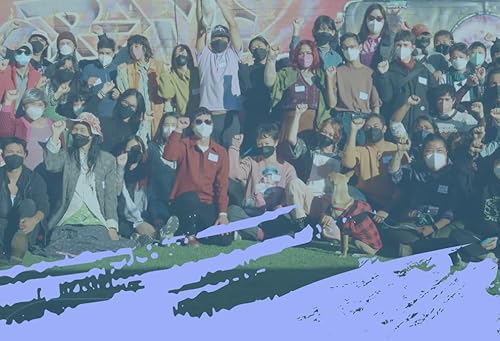A weekly magazine-style radio show featuring the voices and stories of Asians and Pacific Islanders from all corners of our community. The show is produced by a collective of media makers, deejays, and activists. Guest host Jovelyn Richards presents White Switch WHITE SWITCH Show Transcript Opening: [00:00:00] Apex Express Asian Pacific expression. Community and cultural coverage, music and calendar, new visions and voices, coming to you with an Asian Pacific Islander point of view. It’s time to get on board the Apex Express. Jovelyn Richards: [00:01:07] Hi, this is Jovelyn Richards and I’m happy to be here on Apex. Some of you may know me from Cover to Cover, which is every Tuesday at two o’clock, which I, um, spend time with artists, filmmakers, uh, writers, play writers, poets, to bring that to my audience. And on every third Monday you would hear me on Women’s Magazine and my colleagues. We all take one Monday and Tuesday on different topics from a feminist perspective, from a global perspective. And my specific way of approaching that is to look at writings and, um, that’s either from fiction or either it is nonfiction, but at the core of it, because my interest really is getting to the story of what it’s like to be human. Jovelyn Richards: [00:02:05] Those reflect characters topics that really dig inside of that written by women who was in search of, in their research, their lives of highlighting either known people or ordinary people who are. Living in ways in which moves humanity forward. So that’s where you’ll find me. And so why am I here? I’m here because I did a project, uh, over a year ago, and this, this, uh, tape is, uh, this program is a long time coming. I partnered with this particular project with, so when you would be familiar with, and that’s Preeti Shekar last name is spelled S-H-E-K-A-R. And we began this story, uh, of looking at anti-blackness in the South Asian community together. So what I’m going to do is let you listen to a clip, not from Preeti or myself. But from someone else’s doing this anti-blackness work in South Asian communities with Ritu Bhasin, and the last spelling of her name is B-H-A-S-I-N. So we’ll take a listen to that and then I will be right back and have that discussion. CLIP PLAYS Jovelyn Richards: [00:04:46] All right, so here we go. And so one of the things I appreciated seeing and listening to her video when I first was introduced to her, that aligned with the work that myself and Preeti was doing in our project curriculum called The White Switch, and we’ll dig into that. What is the White Switch? What is the curriculum of the White Switch and how it came about? And so what I appreciate, the continuous work, you may wanna Google, if you don’t already know, you probably do with Ritu Bhasin, uh, because she speaks directly about anti-black, uh, racism within South Asian communities, especially among professionals and leaders. And as you’ve heard in the video, she shares what that experience has been. And I was so happy to be able to offer that in the beginning of this. Uh, broadcast so that it, uh, to break the sense of isolation just in myself. Speaking of it as a black woman, I was hoping that Preeti would be here, but she’s, um, back in India and I’ll talk a little bit about what that’s like for me, uh, that my co-create, um, my partner on this here. Jovelyn Richards: [00:05:59] So the white switch and the history of it for years. Uh. Probably like close to 15 years now. We were part of the beginning of white, uh, women’s magazine and we had wanted to do something together. We knew that we wanted to work together without knowing the why, but every time we were in conversation in the building, uh, women’s magazine and the way I approach the topics, uh, as a collective. And where the resistance was, where the fun of it was at. Uh, and then her way she approached it, there was place the, the connected dots. So example would be for any of our lives, when you’re in very difficult conversations, you pay attention to the other, uh, uh, collaborators or whatever the, what the team is made of. And even if it’s to people and you see whether or not they’re coming from a place of inclusiveness, you’re seeing how, how hard they are holding on to their opinion, whether it’s negotiable, whether they’re really deeply listening. And what was really interesting to where we connect the is that we found that both of us and we were relatively new to each other. Jovelyn Richards: [00:07:20] What we both found is that the humor. That in the heat of it all, or the conflict of it all, there was, we relied on this part of humor to not, to deflate and deflect from the situation, not to deflate it, like take off the, the, the fullness of the topic, but to give us all a moment to breathe in humor. Right? And, and that’s, that is part of my go-to as a standup comedian. So that’s real for me. So. Let’s ...
Show More
Show Less
 1 hr
1 hr 1 hr
1 hr Jan 29 20261 hr
Jan 29 20261 hr 1 hr
1 hr Jan 15 20261 hr
Jan 15 20261 hr 1 hr
1 hr 47 mins
47 mins 1 hr
1 hr
